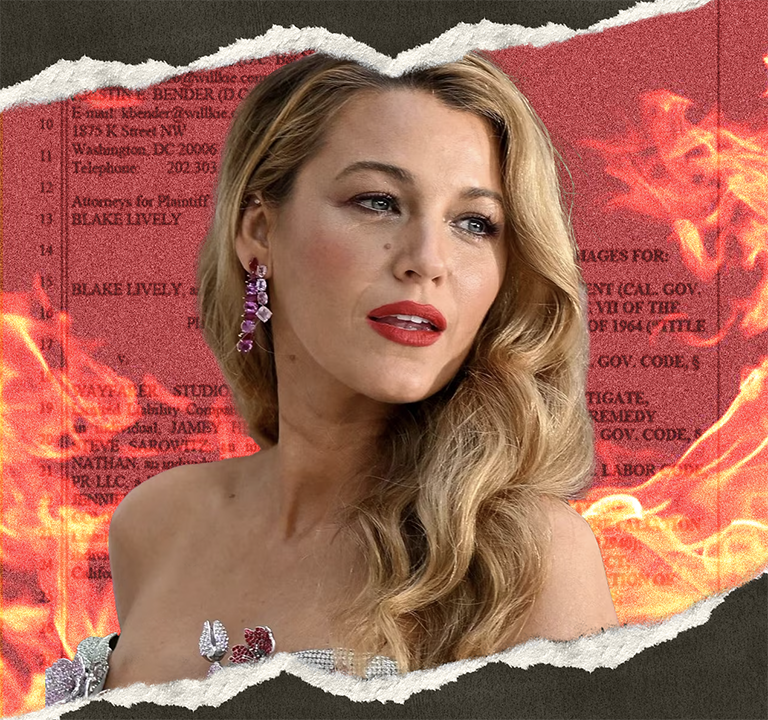Editor’s note: This story contains mention of domestic violence and sexual harassment.
On Aug. 9, the movie adaptation of the Colleen Hoover novel “It Ends with Us” was released. During the promotion of this movie, the media drastically turned to focus instead on Blake Lively, the main actress in the film.
The press began to paint Lively as a narcissistic mean girl who used her tone-deafness to minimize the topic of domestic violence. While Lively made a lot of mistakes in her pursuit to promote the movie, the complete and utter teardown of her character is the epitome of cancel culture and the tangled web of misogyny.
This has become relevant once again as Lively recently filed a bombshell legal complaint against her co-star Justin Baldoni, alleging to sexual harassment and a calculated public relations campaign to plummet her reputation in the public eye.
Although it doesn’t entirely placate Lively’s behavior during the promotion of “It Ends with Us,” it was revealed that Sony had orchestrated a PR plan that Lively was supposed to follow, one in which she was meant to focus on the more uplifting aspects of the film and the superficial aspect of florals.
The line that got Lively the most hate was “grab your friends and wear your florals,” a phrase that undermined the entire topic of the movie, where the main character aims to break the cycle of domestic violence. This was especially disrespectful to those who are domestic violence survivors and could never afford to take such a laissez-faire approach.
While this was transpiring on Lively’s side of the promotion, Baldoni broke away on his own to talk about the pain of domestic violence.
However, the tables seem to have turned ever so slightly. Lively began by filing a complaint with the California Civil Rights Department before going on to file an official lawsuit. Most of the allegations made in the complaint were focused on sexual harassment, professional misconduct and his hiring of PR professionals Melissa Nathan and Jennifer Abel as a form of retaliation.
Lively’s claims on sexual harassment had a couple of layers. The first being that Baldoni, who was also the director and thus in a higher position of power, attempted to add in multiple sex scenes after Lively had already signed off on the script. He also allegedly gave intimate details of his own sex life with his wife that he wanted to see reflected in the film. He then pried into Lively’s sexual relationship with her husband, Ryan Reynolds, which understandably made her incredibly uncomfortable.
Lively was then informed that while Baldoni was directing a sex scene with the younger version of Lively’s character, portrayed by Isabela Ferrer, he allegedly went up to them after they concluded and said “I know I’m not supposed to say this, but that was hot,” and, “did you two practice this before?” This, rather evidently, crossed many professional lines, especially by someone who a few months ago seemed untaintable.
Other instances in the claim included Baldoni engaging in improvised and non consensual kissing while filming, as well as making various sexual comments to Lively. Aside from Baldoni, a producer on the movie, Jamey Heath, was also included in the misconduct claims. She described how Heath showed her pictures of his wife naked and on one occasion watched her when she was topless despite her directly asking him to look away.
Baldoni and Heath both allegedly pressured Lively to be nude in a birthing scene during the movie. Lively did not want to adhere to this as she had not signed off on nudity in the scene. Baldoni said it was “not normal” for women to keep hospital gowns on during birth. This then prompted Heath to come up to Lively and show her a video of his nude wife giving birth. On the surface it is already completely inappropriate and unprofessional, but Lively had already given birth four times in real life and didn’t need to be shown an example of how it was done, especially without her permission.
There were also discussions of previous pornography addictions by Baldoni and Heath, despite Lively trying to shut down the conversations. She also relayed a conversation with Baldoni in which he talked about having previous sexual relations without receiving consent.
Lively additionally included anecdotes where she felt body shamed by Baldoni, including him talking to her trainer to find out how much she weighed.
Lively brought up these concerns to Wayfarer Studios where they had a meeting about the inappropriate behavior happening on set. They agreed to several terms, the most important being that they would hire an intimacy coordinator and Baldoni and Heath would not retaliate against Lively for bringing these concerns to the table.
However, the retaliation agreement was broken when Baldoni hired a crisis PR team including Melissa Nathan and Jennifer Abel. In Lively’s lawsuit she obtained text messages between Baldoni and the PR consultants. The messages, which Baldoni’s team would later say were taken out of context, were pretty clear in their intention.
A message from Nathan read, “The majority of socials are so pro Justin and I don’t even agree with half of them lol.” She also had texted a rather poignant message saying, “It’s actually sad because it just shows you have people really want to hate on women.”
The message sums up the climate toward women in the media. Despite her releasing a 62 page complaint with legally obtained evidence, people still want to silence her and minimize her to a diva. The wakeup everyone needs is that someone doesn’t have to be universally liked to still be a victim.
The most well-known text chain from Lively’s lawsuit came from the beginning correspondence between Nathan and Abel. Abel was on record for writing, “He wants to feel like she can be buried … ”, to which Nathan responded, “You know we can bury anyone. But I can’t write that to him.” No matter what context this is put it, the connotation is crystal clear.
Baldoni and his team have responded to Lively’s narrative by filing a lawsuit against The New York Times, who initially broke the story, for libel. The allegations insinuated that the news outlet was “using doctored and manipulated texts and intentionally omitting texts which dispute their chosen PR narrative.” Baldoni’s lawyer has since voiced intent to file a following lawsuit against Lively herself.
While these facts merely scratch the surface of what has transpired behind the scenes between Lively and Baldoni, it is clear their public dispute is far from over. Everyday more information is coming out about Baldoni’s side of the story.
Some of these stories delve into the ways in which Lively overstepped during the editing process, her “pattern of vindictiveness,” an unsuccessful attempt to ban him from the premiere of the movie he starred in and directed and how she humiliated him at said premiere.
It’s not a secret Lively could have done many things differently, yet she still deserves more compassion than what is being given to her. There has been no end of criticism since she came out with her side of the story. Many are nitpicking her choice to come out with all of this now instead of August, but the truth of the matter is that an over 60 page lawsuit doesn’t appear out of nowhere. She made these moves patiently and pragmatically, so maybe it’s time to believe women, or at least give them the benefit of the doubt.
That also doesn’t mean Baldoni necessarily has to be the villain. It’s plausible there is no villain or possibly they’re both villains — only time will tell.



